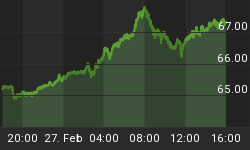Breakfast is said to be the most important meal of the day. Thus far in 2013 breakfast has been not only that, but one of the better investments. The oats in that bowl of hardy cereal, as shown in the chart below, have been a star performer. Those lowly oats have risen in price significantly more than the stock market. Eggs and the butter that goes on the toast also did better. Forget tired tech and bumbling banks, buying breakfast instead for 2013 has been the right move.

Great balls of cotton! How did cotton come to be in second place, far outpacing the stock market? Seems prices were so bad last year that farmers around the world would rather not plant the stuff. As a consequence, world cotton prices have risen by nearly 30% since the Fall low. Demand for cotton around the world has some renewed strength. Appears China missed out on that nasty recession all the gurus had forecast to happen, and the economy in that nation is strengthening. Along with demand for many commodities, Chinese purchases of cotton are recovering. U.S. exports this year, as just one example, will be down slightly from last year, but still be the third highest on record per the USDA. Exports from U.S. to China in December were up 90%.

2013 is to be a year of rotation in Agri-Commodities. In Agri-Food strong prices encourage production and weak prices discourage production. Over priced U.S. corn is encouraging farmers, all around the world, to plant as much acreage as possible in corn. At the same time former cotton producers are turning to soybeans and other crops. Such is the way it works in Agri-Foods.
This rotation does have implications for Agri-Investors. For example, farmers around the world will have good cash flow again in 2013. Part of that will be due to the quite natural rotation of Agri-Commodity prices. Deere and AGCO will gladly sell tractors to farmers regardless of the crop to be planted.

As the above chart portrays, the first tier Agri-Equities have done well. They recently again reached a new high. We are by our nature nervous when stocks have had such a strong run as that pictured in the graph. That admission aside, the prospects for strong Agri-Commodity prices in the years ahead make the fundamentals of these companies some of the best to be found in the equity market.
While the rotation in Agri-Commodity prices now developing is positive for Agri-Equities, it has negative implications for poorly constructed Agri-Commodity investments. Most Agri-Commodity indices and ETFs are over weighted in corn and wheat while under weighted in those used widely in Asia. They tend to be under weighted or void of exposure to palm oil, rice, and cotton. We would avoid all of the diversified Agri-Commodity ETFs this year.
Our excitement is high as AgriMoney: Wealth Creation Through Agri-Food Investments is now available for investors. The book investors have been asking about for some tine is now a reality. AgriMoney is now the primary educational resource for Agri-Investors, new or experienced. See our web site.
Ned W. Schmidt,CFA is publisher of The Agri-Food Value View, a monthly exploration of the Agri-Food grand cycle being created by China, India, and Agri-Energy. To contract Ned or to learn more, use this link: www.agrifoodvalueview.com















